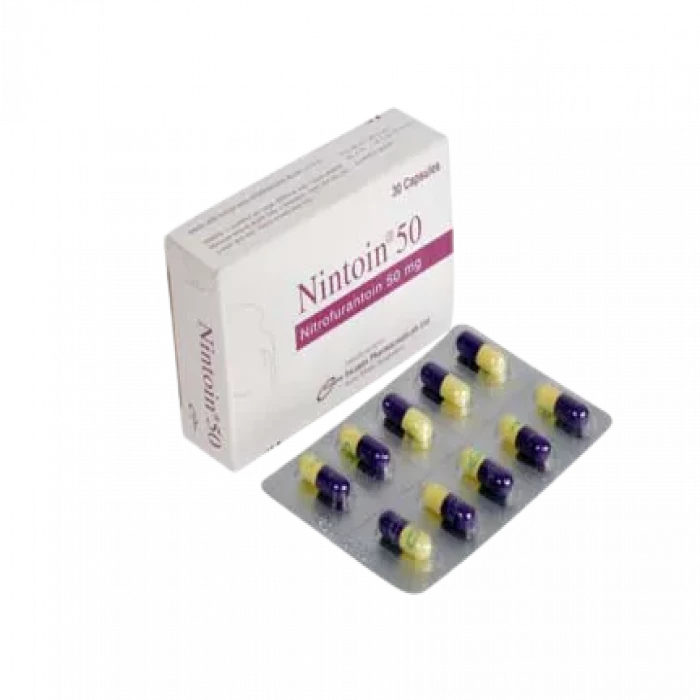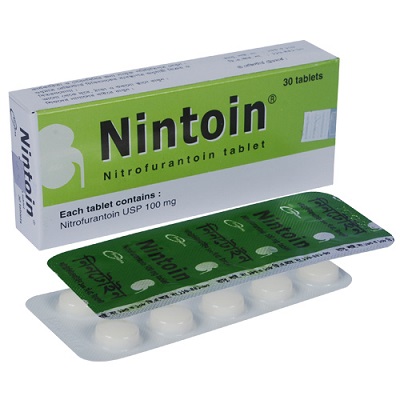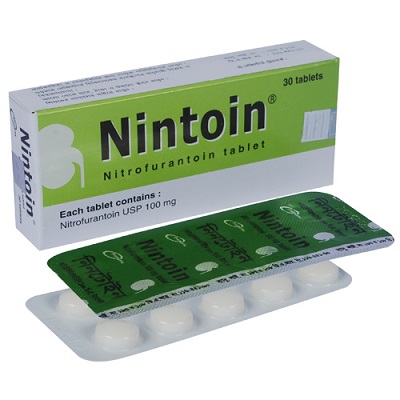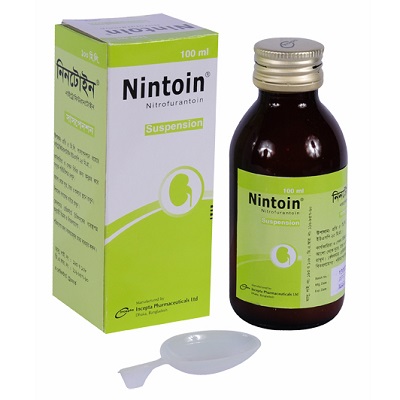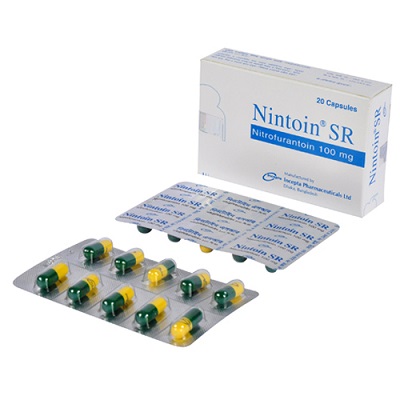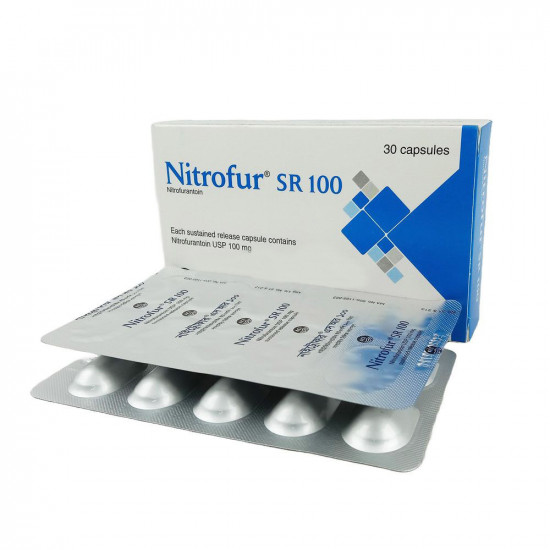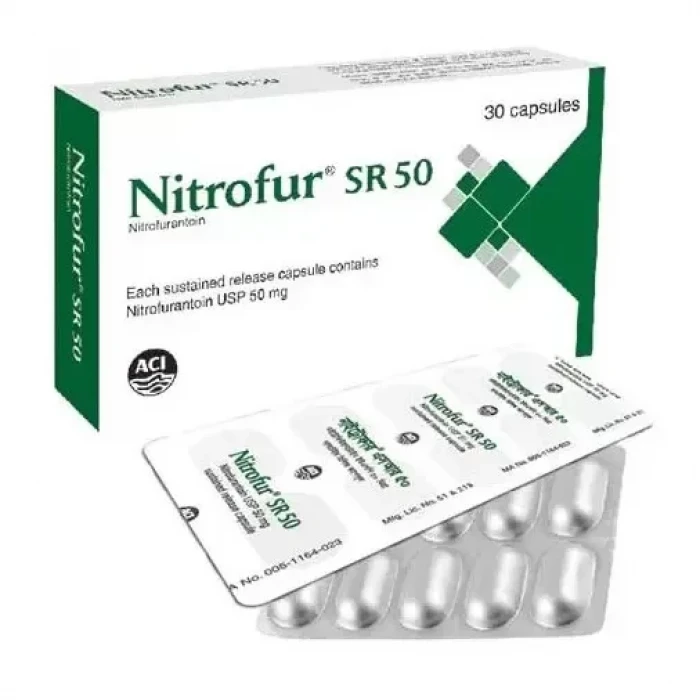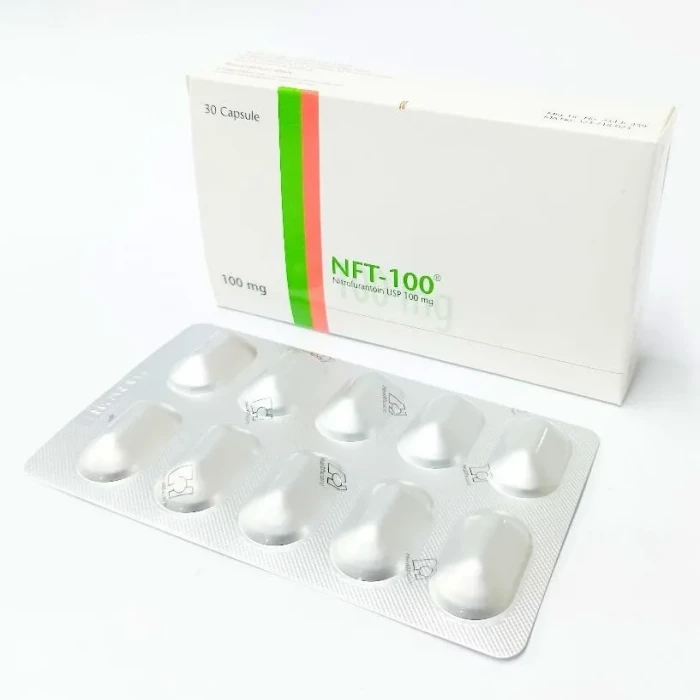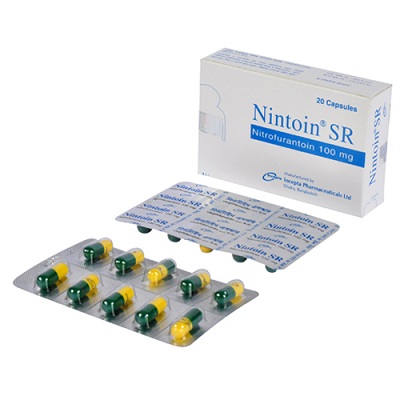
✔ 100% Authentic Product
👁️ Currently Viewing 5997
Nintoin SR 100mg Capsule 10pcs
Nintoin SR 100mg Capsule is a Bactericidal Antibiotic that aids in the treatment or prevention of bladder, kidney, and other parts of urinary tract infections. In people with renal illness, it should be taken with care.
Discount
Price: ৳ 219
MRP:
৳
230
5%
Off

100% Genuine Products, Guaranteed

Safe & Secure Payments, Always

Fast, Secure & Efficient Delivery

Proper Packaging
 Cash on Delivery - All over Bangladesh
Cash on Delivery - All over Bangladesh Regular Delivery - 12-24 Hours, Dhaka City* Charge Tk.39-59
Regular Delivery - 12-24 Hours, Dhaka City* Charge Tk.39-59 Regular Delivery - 24-48 Hours, Other Cities* Charge Tk.99-110
Regular Delivery - 24-48 Hours, Other Cities* Charge Tk.99-110
🌙 রমযান অফার 🌙
 ফ্রি ডেলিভারিঃ - ৭৯৯ টাকা+ অর্ডারে, ঢাকা
শহরে
ফ্রি ডেলিভারিঃ - ৭৯৯ টাকা+ অর্ডারে, ঢাকা
শহরে ফ্রি ডেলিভারিঃ - ২৭৯৯ টাকা+ অর্ডারে, ঢাকার
বাহিরে
ফ্রি ডেলিভারিঃ - ২৭৯৯ টাকা+ অর্ডারে, ঢাকার
বাহিরে
📲 মোবাইল অ্যাপ অর্ডারে সাশ্রয় বেশী
-
Google Play Store থেকে ডাউনলোড
-
Apple Store থেকে ডাউনলোড
100% Genuine Products, Guaranteed
Safe & Secure Payments, Always
Fast, Secure & Efficient Delivery
Proper Packaging
 Cash on Delivery - All over Bangladesh
Cash on Delivery - All over Bangladesh Regular Delivery - 12-24 Hours, Dhaka City* Charge Tk.39-59
Regular Delivery - 12-24 Hours, Dhaka City* Charge Tk.39-59 Regular Delivery - 24-48 Hours, Other Cities* Charge Tk.99-110
Regular Delivery - 24-48 Hours, Other Cities* Charge Tk.99-110 ফ্রি ডেলিভারিঃ - ৭৯৯ টাকা+ অর্ডারে, ঢাকা
শহরে
ফ্রি ডেলিভারিঃ - ৭৯৯ টাকা+ অর্ডারে, ঢাকা
শহরে ফ্রি ডেলিভারিঃ - ২৭৯৯ টাকা+ অর্ডারে, ঢাকার
বাহিরে
ফ্রি ডেলিভারিঃ - ২৭৯৯ টাকা+ অর্ডারে, ঢাকার
বাহিরে- Google Play Store থেকে ডাউনলোড
- Apple Store থেকে ডাউনলোড
🌙 রমযান অফার 🌙
📲 মোবাইল অ্যাপ অর্ডারে সাশ্রয় বেশী
✅ Description:
Nintoin SR 100mg Capsule (Nitrofurantoin) is an antibiotic used to treat and prevent urinary tract infections that affect various parts of the urinary system. The symptoms of this infection include frequent urination, burning sensation while urinating, cloudy urine, reduced urine flow, and pelvic pain, especially in women.
While taking Nintoin SR 100mg Capsule, your doctor will monitor your liver and lung function regularly. It may also interfere with urine tests for sugar, resulting in a false positive.
Patients with liver or lung disease, anemia, diabetes, severe weakness, electrolyte imbalance, vitamin B deficiency, or severe kidney disease should take Nintoin SR 100mg Capsule with caution. Pregnant women should not use this medicine during labor or delivery, and breastfeeding women should use it with caution.
Nintoin SR 100mg Capsule is not recommended for infants under three months old, and elderly patients should use it with caution. The most common side effects include nausea, vomiting, loss of appetite, and diarrhea. If any side effects worsen, consult your doctor.
Safety Advices

Alcohol
UNSAFE
Avoid drinking alcohol while taking Nintoin SR 100mg Capsule since it may induce dizziness.

Pregnancy
CONSULT YOUR DOCTOR
Nintoin SR 100mg Capsule is not indicated for usage during labor or delivery due to the danger of harming the infant. It should be taken with caution in pregnant or intending to have a baby ladies. However, before using Nintoin SR 100mg Capsule, ask your doctor.

Breastfeeding
CONSULT YOUR DOCTOR
Nintoin SR 100mg Capsule should be taken with caution by nursing mothers and avoided in particular for infants with known or suspected erythrocyte enzyme insufficiency (including G6PD deficiency) since it may pass via breast milk. Before using Nintoin SR 100mg Capsule, consult your doctor.

Driving
CAUTION
Do not drive or operate any machines if you feel dizzy or drowsy after taking Nintoin SR 100mg Capsule.

Kidney
CONSULT YOUR DOCTOR
Nintoin SR 100mg Capsule is not recommended for use in patients with kidney disease that severely affects the function of the kidneys. It should be used with caution in patients with kidney problems. Consult your doctor before taking Nintoin SR 100mg Capsule.

Liver
CAUTION
Nintoin SR 100mg Capsule should be taken with caution in patients with liver disease. Consult your doctor before taking Nintoin SR 100mg Capsule.
✔️ Uses of Nintoin SR 100mg Capsule
- In the Treatment of Bacterial infections of the Urinary tract
✔️ How does Nintoin SR 100mg Capsule work?
Nitrofurantoin, the active ingredient in Nintoin SR 100mg Capsule, works by interfering with the production of bacterial DNA, which is essential for the bacteria to grow and multiply. By disrupting this process, the drug kills or inhibits the growth of the bacteria responsible for urinary tract infections. This is how Nintoin SR 100mg Capsule is able to effectively treat and prevent urinary tract infections caused by susceptible bacteria.
✔️ Side Effects of Nintoin SR 100mg Capsule
- Skin rash
- Fever and chills
- Burning or tingling sensation
- Headache
- Drowsiness
- Diarrhea
- Excessive gas in the stomach
✔️ Quick Suggestions:
- Nintoin SR 100mg Capsule treats and prevents uncomplicated urinary tract infections.
- Finish the prescribed course of medicine, even if you start to feel better. Stopping it early may make the infection come back and harder to treat.
- Take it with food to avoid nausea, which is a common side effect.
- It can turn your urine a dark yellow or brown color. This is normal and nothing to worry about.
- Do not take it for longer or more often than prescribed by your doctor.
✔️ Indication of Nintoin SR 100mg Capsule
An antibiotic that fights bacteria is called Nintoin 100. It is applied to the treatment and avoidance of simple urinary tract infections. It functions by eradicating the bacteria responsible for the disease. However, it won't help with viral infections. The doctor's recommended dose and duration for taking Nintoin 100 should be followed.
✔️ Pharmacology
Nitrofurantoin is an effective antibiotic used to treat urinary tract infections, as it is highly soluble in urine. It may cause stool to turn brown. Nitrofurantoin works by inactivating or altering ribosomal proteins and other macromolecules produced by bacteria. It is effective against various bacteria, including Gram-positive aerobes such as Enterococcus faecalis, Staphylococcus aureus, Streptococcus agalactiae, coagulase-negative staphylococci including Staphylococcus epidermidis, and Viridans group streptococci, as well as Gram-negative aerobes such as Escherichia coli, Citrobacter amalonaticus, Citrobacter diversus, Citrobacter freundii, Klebsiella oxytoca, and Klebsiella ozaena.
✔️ Dosage & Administration of Nintoin SR 100mg Capsule
- For adults and children over 12 years old, the recommended dose is one 100 mg capsule every 12 hours for seven days.
- In the case of genito-urinary surgical prophylaxis, one capsule should be taken twice daily on the day of the procedure and for the next 3 days.
- It is important to follow your physician's instructions when taking Nintoin SR 100mg Capsule. The tablet should be swallowed whole with a glass of water and should not be crushed or chewed. The correct dose of Nintoin SR 100mg Capsule will depend on factors such as your age, body weight, and the severity of your infection, and should be determined by your doctor.
- To ensure the effective functioning of the medication and to avoid stomach upset, Nintoin SR 100mg Capsule should always be taken with food or milk. If you experience any unusual symptoms or side effects while taking Nintoin SR 100mg Capsule, it is important to inform your doctor immediately.
✔️ Interaction
There are some drug interactions that can affect the absorption and efficacy of nitrofurantoin. For instance, the excretion of nitrofurantoin can be reduced when it is taken with probenecid or sulfinpyrazone. Similarly, the absorption of nitrofurantoin may be reduced when taken with magnesium trisilicate.
Moreover, quinolone antibiotics may have antagonistic effects with nitrofurantoin, which means they may reduce its effectiveness. On the other hand, the effects of nitrofurantoin may be reduced when taken with carbonic anhydrase inhibitors or urinary alkalinizers.
It is important to inform your doctor about any medications, supplements, or herbal products you are taking before starting nitrofurantoin therapy. They can help determine if there are any potential drug interactions and adjust the dose or timing of medications accordingly.
✔️ Contraindications
Nitrofurantoin should not be used in individuals with severe renal impairment, which includes anuria (complete absence of urine), oliguria (decreased urine output), significantly elevated serum creatinine levels, and CrCl (creatinine clearance) below 60 ml/min. It should also not be used in individuals who have hypersensitivity to nitrofurans, G6PD (glucose-6-phosphate dehydrogenase) deficiency, or in infants below 3 months of age.
Moreover, nitrofurantoin should not be used in pregnant women at term, during labor and delivery, or when the onset of labor is imminent, as it may harm the baby. It is important to consult a doctor before taking nitrofurantoin or any other medication and to inform them about any medical conditions, allergies, or pregnancy.
✔️ Pregnancy & Lactation
Nitrofurantoin is classified as a Pregnancy Category B medication, which means that there are no adequate and well-controlled studies on pregnant women. Therefore, nitrofurantoin should only be used during pregnancy if it is absolutely necessary and the benefits of the medication outweigh the potential risks.
Nitrofurantoin has been found in small quantities in human breast milk. Nursing mothers should carefully consider the risks and benefits of nitrofurantoin before deciding to continue breastfeeding. If the drug is deemed necessary for the mother's health, breastfeeding should be stopped while taking nitrofurantoin, especially in infants under one month old who may be at higher risk of significant adverse effects from the medication. It is important to consult a doctor before taking any medications during pregnancy or lactation.
✔️ Precautions & Warnings
- If a patient experiences acute, sub-acute, or chronic pulmonary reactions while taking nitrofurantoin, the medication should be discontinued immediately. Antacid preparations containing magnesium trisilicate should not be taken simultaneously with nitrofurantoin.
- Elderly patients should be monitored for hepatic and pulmonary function during prolonged therapy with nitrofurantoin. Patients with pre-existing pulmonary, hepatic, neurological, or allergic disorders, as well as those predisposed to peripheral neuropathy (e.g., renal impairment, anemia, diabetes, electrolyte imbalance, debility, and vitamin B deficiency), should be carefully monitored during treatment. If any signs of peripheral neuropathy occur, nitrofurantoin should be discontinued.
- Nitrofurantoin enters breast milk, and therefore, it is not recommended for use during lactation. Nursing mothers should either discontinue the drug or not nurse their infants. It is important to discuss any concerns with a doctor before taking any medications during pregnancy or lactation.
✔️ Storage Conditions
Do not store above 30°C. Keep away from light and out of the reach of children
⚠️Disclaimer:
At ePharma, we’re committed to providing accurate and accessible health information. However, all content is intended for informational purposes only and should not replace medical advice from a qualified physician. Please consult your healthcare provider for personalized guidance. We aim to support, not substitute, the doctor-patient relationship.




